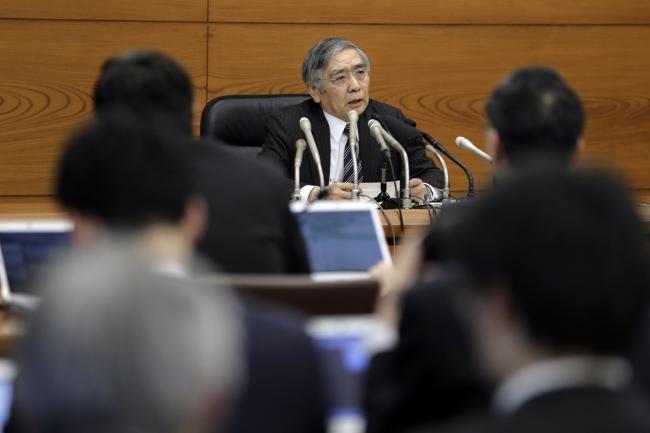(Bloomberg) -- Prime Minister Shinzo Abe nominated Haruhiko Kuroda to lead the Bank of Japan for another five-year term, with the Cabinet forwarding the nomination to parliament on Friday.
Central bank insider Masayoshi Amamiya and university professor Masazumi Wakatabe were tapped to be deputy governors.
The appointments -- among the worst-kept secrets in Japan -- provide stability for the world’s third-largest economy and mean aggressive monetary stimulus will stay in place for now. Kuroda also offers global continuity in a year of transition for other central banks, with Jerome Powell newly installed at the helm of the Federal Reserve and People’s Bank of China chief Zhou Xiaochuan thought likely to step down.
“The choices point to continuity in policy, with an implicit message that Japan will do what it takes to reflate the economy, even as other major central banks start to withdraw stimulus," Bloomberg Economics’ Yuki Masujima wrote.
Kuroda and executive director Amamiya have worked closely together in crafting the current policy framework, and Wakatabe is a committed reflationist who has written books on policy with other advocates of stimulus such as Koichi Hamada.
‘Mr. BOJ’: Amamiya has been shaping policy behind the scenes.
Former BOJ board member Takahide Kiuchi noted a similarity between the three nominees and the current leadership trio. "You have Governor Kuroda, a deputy governor who’s a BOJ insider, and another who is a reflationist academic," said Kiuchi, whose term ended last year. "In financial markets, there may be some thinking that Wakatabe will be able to influence the direction of monetary policy toward more easing, but I think the chance of that is low."
Kuroda declined to comment to reporters after the nominations were announced.
Masujima said the early nominations -- Kuroda’s term doesn’t end until April -- suggest Abe is signaling a determination to counter a recent surge in the yen. "The move could work as a sort of stealth intervention in the super-volatile FX market -- countering yen strength to keep inflation on track to a still-distant 2 percent target," he said.
The yen has gained about 6 percent this year, making it one of the strongest performers among major currencies. It appreciated to trade at 105.80 as of 5:20 p.m. in Tokyo.
Officials from the central bank, Ministry of Finance and Financial Services Agency met Friday afternoon in Tokyo to discuss the yen’s recent moves. Masatsugu Asakawa, the chief of foreign-exchange policy at the finance ministry, said they were watching the market with concern. The moves were one-sided and not in line with fundamentals, he said.
"We reconfirmed that we will take appropriate steps proportionate to what’s needed in line with the G-7 and G-20 agreements," Asakawa said.
The BOJ’s next policy meeting is on March 8-9. Kuroda’s new term starts on April 9. The two deputies will take up their duties on March 20, after Hiroshi Nakaso and Kikuo Iwata step down. The new leadership will begin deliberating policy at the April 26-27 gathering.
Of 43 economists surveyed by Bloomberg last month, none projected change in March, two expected policy tightening in April. Eighteen forecast tightening sometime later in the year while 21 see it coming in 2019 or later.
While Kuroda, 73, has repeatedly said it’s vital to continue current “powerful” stimulus with yield-curve control, the policy is likely to evolve as conditions change.
Abe’s picks are subject to confirmation by upper and lower houses at parliament, where his ruling coalition holds a majority.
Wakatabe, 53, said in December that changing Japan’s expansionary monetary policy now would be premature. He’s also indicated that additional stimulus could be needed to overcome the negative impact of a sales-tax hike planned for 2019.
The Newcomer: Wakatabe’s views on monetary policy.
Amamiya, 62, brings almost four decades of experience inside the BOJ to the deputy role. Flexibility has been a hallmark of his approach, having served under governors with starkly different approaches to policy.
Some economists have said Kuroda’s age is a concern. He would be 78 and the longest-serving governor in BOJ’s 135-year history if he serves the full term through April 2023.
Even as the economy enjoys its longest stretch of uninterrupted growth in 28 years, challenges are mounting. Japan’s inflation rate remains far from the BOJ’s target, while a stronger yen threatens export competitiveness and weakens the inflationary impact of import costs. Wage gains are tepid.
Click here to read more on Japan’s latest growth report.
With the Federal Reserve already well into a rate-hike cycle and the European Central Bank moving closer to tapering, Kuroda will face more pressure to unveil his plans for how to eventually wind back stimulus and shrink the BOJ’s balance sheet, which has swollen to almost the same size as Japan’s 549-trillion yen ($5.2 trillion) economy.
"Kuroda’s next five years will continue to be difficult," said Kazuo Momma, a former BOJ executive director. "The BOJ’s tool box is almost empty and the inflation target is very far away."
(Adds meeting on yen, comment from top currency official.)
